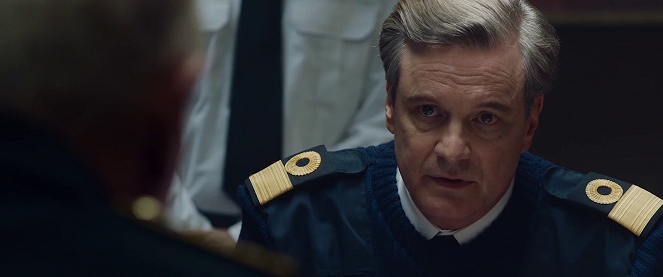Directed by:
Thomas VinterbergScreenplay:
Robert RodatCinematography:
Anthony Dod MantleComposer:
Alexandre DesplatCast:
Matthias Schoenaerts, Léa Seydoux, Colin Firth, Peter Simonischek, Magnus Millang, Max von Sydow, Artemiy Spiridonov, August Diehl, Bjarne Henriksen (more)VOD (5)
Plots(1)
When a Russian naval exercise goes horribly wrong, the Kursk submarine erupts in flames killing most of the men onboard and sending the trapped survivors to the bottom of sea. Time is running out for Russian Captain Mikhail Averin (Matthias Schoenaerts) and his crew, as fire engulfs the vessel starving them of oxygen. Ignoring the advice of their own people, the Russian government refuses the help of the UK Navy operation headed by Captain David Russell (Colin Firth). When they finally give way to mounting domestic pressure, it's too little too late. (Signature Entertainment)
(more)Videos (4)
Reviews (9)
I would like to draw your attention to Marigold's submarine dogma in advance: submarine = automatically * plus. Because according to all other criteria, Thomas Vinterberg shot only a slightly above-average genre template. A celebration of boyish friendship spiced with sentiment and two-dimensional characters. He tries to draw something more from the jerky screenplay by Robert Rodat (among others, Saving Private Ryan) through format changes, veristic filming and emphasis on wordless details (a boy as a silent witness and conscience). But there is simply nothing more in this film. The real case is devastating and could do without the extra drama. The film works because some of the sequences are catchy (underwater search for oxygen cartridges in one suffocating shot) and Schoenaerts does a decent job in the lead role, as does Firth in the supporting role. As a Kursk Memorial it is dignified, but above the surface the film does not release the conflict between the Hollywood template and the attempt to conceive it as a civil statement about the tragedy of ordinary people. The performances of broken mothers then inadvertently resemble bad theater. It's a shame, but the years in development hell didn't help.
()
Movies about submarines usually bore me, which fortunately I can't say about The Command. Vinterberg managed to record the infamous story of a great human tragedy, for which the Russian Admiralty is to blame, quite comprehensively and very realistically. I was infinitely distressed at the thought of how all those young men must have felt as they deliberately waited for death in a badly damaged submarine. Their families, losing their last vestiges of hope with each passing hour after the accident, probably need not be mentioned. Matthias Schoenaerts fought for survival at the bottom of the Barents Sea so fiercely and convincingly that I secretly hoped for his rescue. (80%)
()
The Command is drowning in an obviously endlessly cut post-production hell where there's no time for practically anything, so the character roles are either melodramatic, expositional, or agents of righteous popular anger, without giving us a chance to lick anything real out of any of them. The sequences with the clucking wives in particular sound almost funny in their attempt to somehow smuggle female characters into the overall story, who in all three scenes gradually don't find out what happened to their husbands. But according to the film's stills from scenes that aren't in the film at all (see gallery), far more importance was probably attached to their relationship with each other and their subsequent desperate inability to act. One thing is rather unique about The Command, though. Namely, that we're watching heroes who find themselves in a situation familiar from many other films that we're used to seeing them overcome in the name of a happy ending and our reward for the suspense. The scenes from inside the submarine have exactly the same character and development as all other scenes of this type, except that we know from the beginning that it's not going to end well and everyone is going to die. Yet we experience the same situations, great sacrifices, and unimpressive heroics that, if it had ended well, would have underscored their importance in preserving the characters of the protagonists. Of course, the feeling of holding your breath in the underwater sequences with the hero trying to pull an unconscious friend above the surface, even though you know they have only a few hours to live anyway, doesn't really inspire suspense so much as it teaches a lesson about the power of self-preservation in the face of an imminent and complete end. Self-preservation that no one will ever know about, but which gives meaning to existence until its last moment.
()
The portrayal of the character of the sailors is poor and two-dimensional, even in the tense “it’s not there” moments. The portrayal of the life in a submarine and the accident is, on the other hand, brilliant. It’s dark, claustrophobic, chilling and without pathos. Vinterberg successfully reconstructs an historical event about the life and death of the sailors of a nuclear submarine and the main thing missing is, paradoxically, a bit of life and energy.
()
I remember the TV coverage of the disaster and the film captures it faithfully, including the injection of a sedative to one of the distraught mothers. Anyway, one thing is clear from the film: if something similar happened to any of the NATO armies that the local Putin trolls spit on as much as they can, their leadership might break ranks to save these boys. But the Russian military leadership has a different yardstick, the ‘there’s plenty of us’ rule. In Russia, human life has never been worth anything, ever since the Battle of Stalingrad, when they deployed young unarmed boys to the front lines with firing squads at their backs. As Papa Stalin used to say: “The death of one man is a tragedy, the death of millions is a statistic.” Russia, a land of unlimited possibilities...
()



Ads